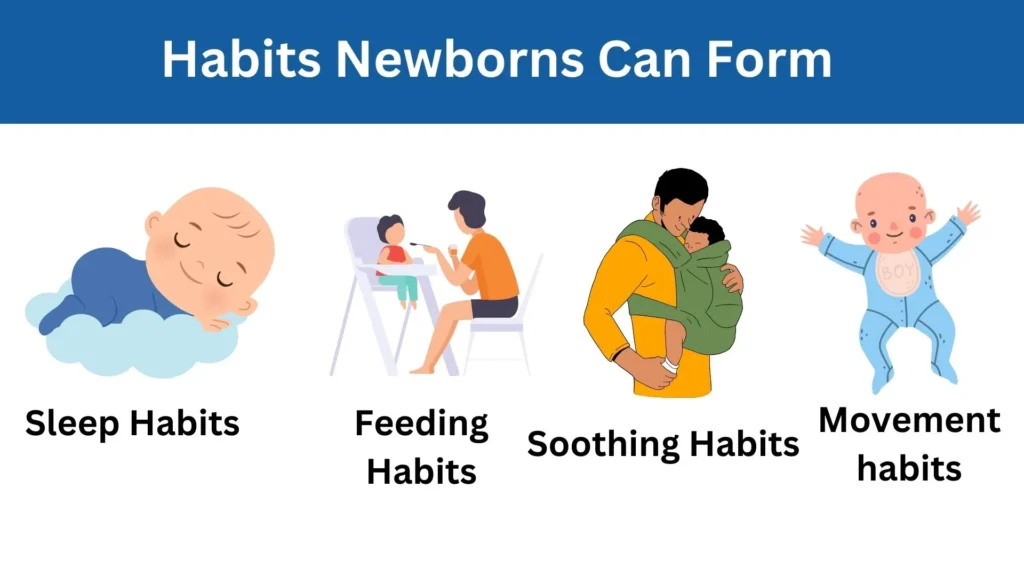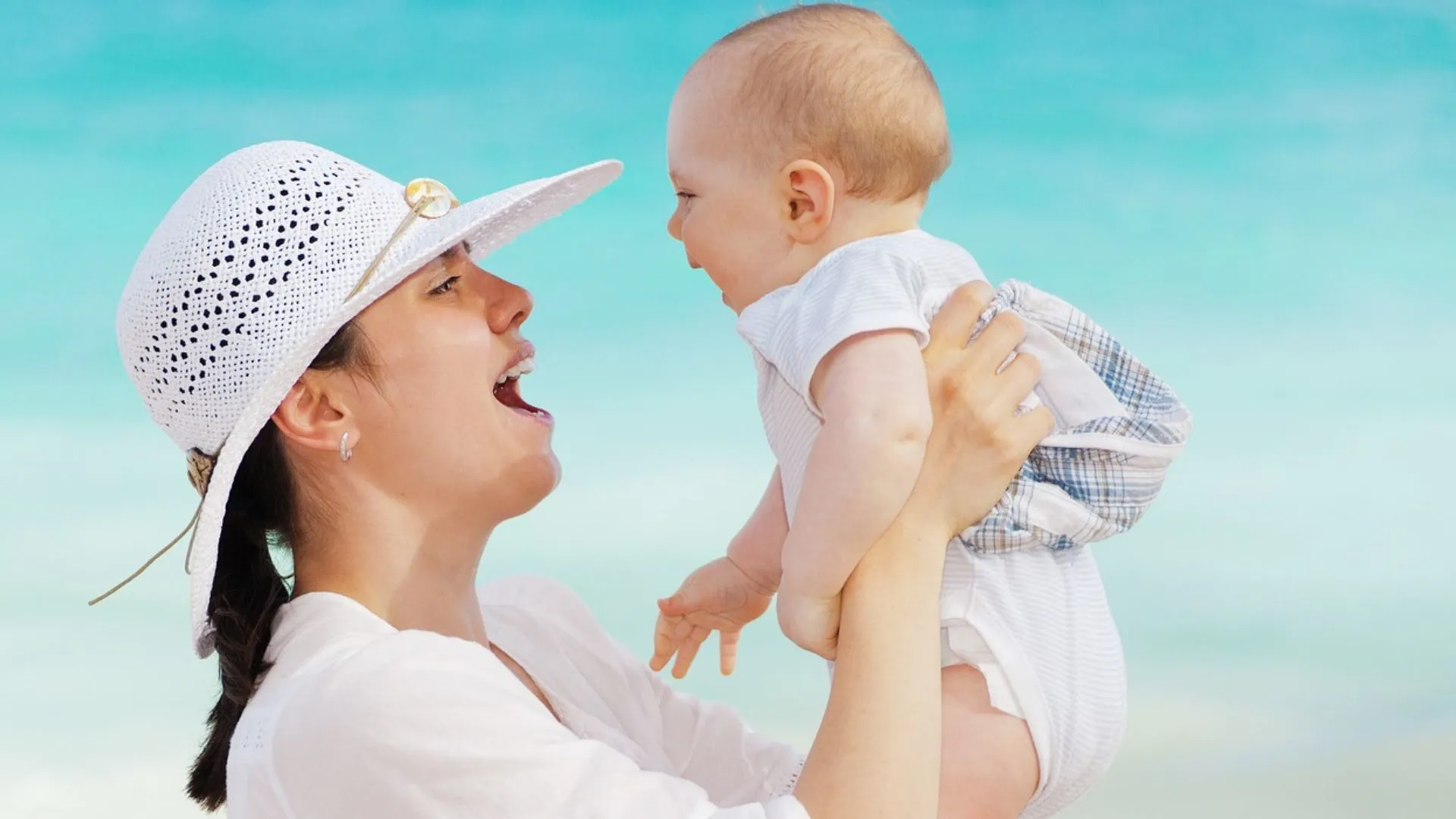Can newborns form habits? Of course, yes. As a well-known pediatrician, T. Berry Brazelton, says, “Newborns aren’t born with habits, good or bad. They learn them from us. It’s our job to guide them toward healthy patterns.”
Understanding newborn’s habits is crucial for parents to mend them earlier. Parents can provide better support and care to their babies by understanding their behaviors.
You might be curious about how babies form habits. This blog aims to give a comprehensive view of newborn habits, ranging from sleeping habits to crying and feeding routines.
Table of Contents
Can Newborns Form Habits? Behaviors and Patterns
Babies can form different habits. Some habits, behaviors, and patterns that babies can form are discussed below:

1. Sleep Habits
Newborns have different sleep patterns due to their individuality. Generally, newborns sleep 8-9 hours per day, but this may fluctuate depending on the baby.
By 1-3 months of age, newborns can form sleep habits. They sleep in cycles (short bursts), usually around 20 to 50 minutes long. Parents must create a sleeping schedule for newborns.
Confirming Wendy Hall’s 2015 hypothesis, it has been found that sleep training boosted the sleep period by 8.5 %, with trained infants averaging 204 minutes in contrast to non-trained infants averaging 188 minutes. Feeding routines, offering a Pacifier, and rocking to sleep are some ways to ensure healthy sleeping habits.
2. Feeding Habits
Newborns can form feeding habits. They usually have small tummies, so they require day and night feeding. Typically, babies require 8 to 12 feedings a day, spaced roughly every two to three hours.
Creating a feeding routine with your baby is necessary to ensure good eating habits. Breastfeeding should be prioritized in comparison to infant formula.
According to recent data, 83.2% of infants begin breastfeeding, while exclusively breastfeeding rates at 6 months of age stand at 24.9%. Parents should focus on responsive feeding and creating consistent feeding routines.
3. Soothing Habits
Newborns usually cannot develop self-soothing habits. Parents or caregivers can do so by certain techniques. These techniques involve:
- Having a consistent go to bed routine
- Affection at bed-time
- The quite dark room at night time
- Not letting baby nap for more than 3 hours
- Make the baby play throughout the day so they can sleep well in the night.
Babies learn self-soothing at the age of 3 months. Parents should work on healthy feeding and sleeping habits so that newborns self-soothe effectively after 3-4 months of age.
4. Movement habits
Movement is another type of habit newborns can form. The physical activity of newborns is reflex or involuntary during the first 8 weeks. They don’t know how to move their legs or hands and cannot decipher their needs to their parents.
Newborns develop certain movement habits with time, indicating their development characteristics, which are Reflexes like gripping, latching, rising to stand, and surprising.
At eight weeks of age, newborns start exploring their movements by kicking their legs and lifting their heads lying on their tummy. At 3 months of age, newborns start waving their feet and hands into the air and direct their fists toward desired objects.
Settling Your Newborn
Settling your newborn means providing your baby comfort by responding to his needs. By providing comfort, newborns can form habits like sleeping and feeding habits.
There are various methods of settling your newborn, like responding to their tiredness and making them sleep.
Some methods involve setting a gentle, consistent sleep and feeding routine, practicing responsive feeding, playing gentle music, and offering a pacifier. These methods will help take away your baby’s fuss and agony and calm them.
Newborn Communication: Crying
On average, babies cry between 1.5 and 3 hours a day. Crying is a newborn’s way of communicating. Generally, newborns are unable to settle during the first three months, which is why they often cry.
Parents should be patient and try to find out the baby’s needs. Crying is not a matter of concern since it’s natural for newborns. However, if it is not normal, parents can seek professional guidance.
You can also explore the 10 best books on habits.
Can Babies Form Bad Habits?
Babies can form bad habits within themselves over time. Newborns actively notice their environments and the people’s behaviors in them.
They tend to imitate things and behaviors. Parents should be conscious of their behaviors to ensure their baby’s healthy development.
Some bad habits that babies can form include the following:
I. Bad Sleeping Habits
Newborns may develop certain bad sleeping habits, which are as follows:
- Waking up of newborn when you place him asleep into the cradle. This will make it difficult to learn that the cradle is for sleep
- Bed Sharing with parents. Research has revealed that bed-sharing can lead to worse sleeping habits.
- When the baby takes naps in your arms, it also suggests his inability to learn that the cradle is for sleep
- Babies never like quiet rooms since they have spent 24 hours in the womb. Make sure to expose them to white noise (containing all frequencies of audible sound).
II. Excessive Crying
Crying is quite normal in newborns since it is their way of communication. However, newborns may develop the habit of excessive crying. They excessively cry due to the following:
- Crying even if their needs are met, like diapering, feeding, and sleeping.
- Relying only on crying indicates a lack of self-soothing in newborns.
- Crying, even in social situations, indicates social anxiety or discomfort.
- Excessive crying also indicates bad temperament.
III. Bad Feeding Routines
Newborns can develop bad feeding habits, which include the following:
- They may use feeding as their comfort even if they are not hungry.
- Babies may develop negative associations with feeding when parents feed them forcefully.
- Babies may gain weight, spit up, and show discomfort over feeding when parents overfeed babies.
Can You Create Bad Habits with Newborns
If newborns can form habits, then you can create bad habits in them. Parents may create certain bad habits in their newborns, leading to their unhealthy and bad habits.
These habits, like rocking newborns to sleep or relying on nighttime bottle feeding, can initially seem comforting but may result in long-term challenges for both the baby and parents.
Understanding these bad habits can enable parents to ensure their baby’s healthy growth and the development of good habits. After understanding, parents can work to break these habits for their newborn, just like stopping other bad habits.
I. Rocking Newborns to Sleep
Rocking newborns to sleep is natural for parents, but it will create bad habits in the newborn. Rocking before sleep makes newborns sleep since it gives them the sensation of the womb.
However, it might make them rely on it and inhibit self-soothing. Parents, therefore, must rock the baby but stop rocking him when he feels drowsy.
II. Feeding Before Sleep
Feeding stimulates the oxytocin, the love hormone in newborns. It helps them fall asleep, but relying totally on feeding for sleep can create bad habits in newborns.
Parents may not avoid it completely, but after feeding, it can rouse their baby a little. This will make them fall asleep.
III. Driving for Newborn Sleep
Babies can form habits of sleep associated with driving. Newborns tend to sleep as long as they are in the car. It helps in settling and serves as white noise which makes them fall asleep.
It is totally fine in the initial weeks, but as long as the newborn is three months old, parents should find ways to break this habit. They should try to make sure their baby is sleeping in the cradle in their rooms.
IV. Nighttime Bottle Feeding
Nighttime bottle feeding can soothe the newborn and make him fall asleep. But, this will create a bad habit in them. Parents should avoid it since bad habits lead to increased weight, ear infections, and tooth decay. It can also disturb the sleep patterns of the newborn.
V. Using Body as Sleep Crutch
Babies tend to use any part of your body as a support to fall asleep. It cannot be avoided initially, but with time, parents should avoid this bad habit.
It is inconvenient for both the newborn and the parents to sleep. Parents can give the baby plastic objects or toys that feel like real body parts.
Seeking Help and Professional Guidance
Parents who want to keep themselves updated about their newborn habits should consult pediatric experts. They will provide insights about newborns’ habit formation and help their babies develop and grow.
Parents should seek professional guidance from experts. They can also join online platforms to navigate newborns’ habits. Similarly, they can also use the notion to track babies’ habits.
Dos and Don’ts for Parents
A list of certain Do and Don’t for parents is shared to help them in their newborn’s upbringing.
| DO’S | DON’TS |
|---|---|
| Schedule bed-time routine | Not responding to newborn needs |
| Choose breastfeeding over formula | Rocking or feeding newborn to sleep |
| Work on responsive feeding | Without considering causes, disregarding crying |
| Be conscious of tiredness and needs | Feeding newborn without hunger signs |
| Settle newborns with soothing techniques | Using the parent’s body as a sleep crutch |
| Encourage baby to play throughout the daytime | Encouraging crying without consulting experts |
Significance of Studying Newborn Habits
Those who are curious about the query of newborn form habits must know the significance of studying babies’ behaviors and patterns.
A study of newborn habits is necessary for their good long-term habits. Parents can play a pivotal role in their baby’s healthy development by navigating their newborn habits and working on them.
They can attempt to promote their newborn good habits and break their bad habits on time. Moreover, this study can also lead to development in the field of pediatric medicine and can enable researchers to help babies globally.
Conclusion
Parents need to understand the formation of their newborn habits for their development and growth. From the understanding of bad habits and the creation of them within newborns, all parents should care about babies’ habit development. Various Do’s and Don’ts have also been discussed, which will enable parents to fulfill their child’s requirements.
FAQs
How can parents break their newborn’s bad habits?
Newborns can develop bad habits like bad sleeping habits, feeding routines, and excessive crying. Parents can break these habits by developing bed-time and feeding schedules and responding to their newborn’s needs during crying. Consistency and patience are the key.
What should parents do if they notice concerning habits in their newborns?
Parents can seek help from various people, especially if they are new parents. They can seek professional guidance from pediatric experts and can ask their family, friends, and support groups. Online platforms can also help.




